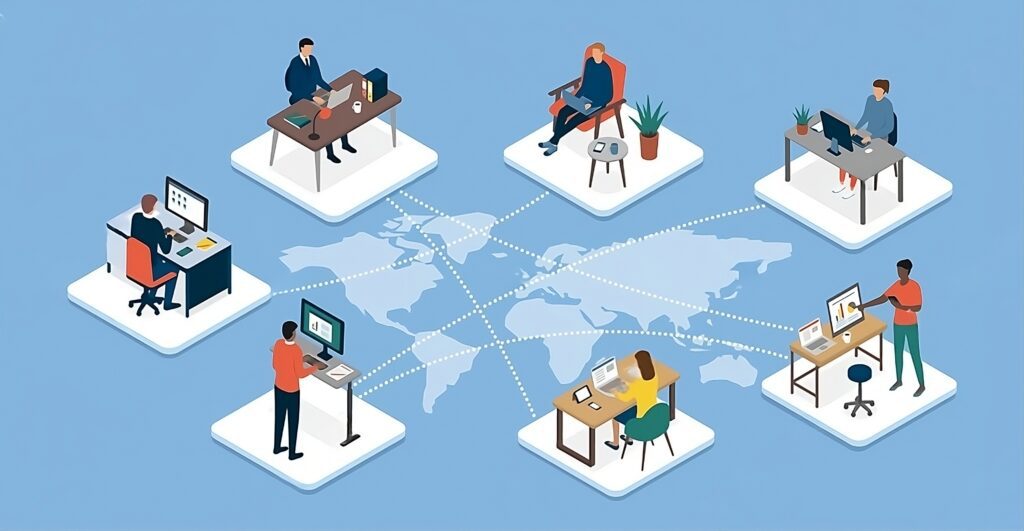
Are you having trouble getting your next software project done on time? You are not the only one. To deal with escalating prices, protracted hiring cycles and a lack of tech talent, many companies turn to software development outsourcing.
That’s why software outsourcing is becoming more popular. It lets you finish the work without using up all your in-house resources. Companies are working with dedicated development teams throughout the world, from small startups to huge corporations.
It’s not just about saving money anymore to outsource software development. It’s about getting better at what you do, being more flexible and staying focused on what you do best.
Let’s look at why software outsourcing services are a game changer and how to make them work for your organization.
Table of Contents
ToggleWhat is Software Outsourcing?
Software development outsourcing means engaging a team from outside your company to build or maintain your software.
You give some or all your development responsibilities to a reliable third-party vendor instead of doing them all yourself. This could be a freelancer, a small development company, or a big software outsourcing company.
You can outsource the design, frontend, backend, QA testing, or even the whole product. What happened? Your internal team stays small and focused while development occurs in the background.
This type lets you be flexible without losing quality.
Why Software Outsourcing is Crucial for Your Business
A lot of organizations are choosing to outsource software development for a good reason.
There are a few:
1. Quicker delivery
Teams that work for other companies are ready to go. There are no delays in onboarding. There are no long hiring cycles. Right away, development starts.
2. Getting to know people from across the world
You don’t have to stay in your city or area. You receive experts from all over the world who know how to work with your IT stack and help you reach your goals.
3. Cost-effectiveness
You save money on salary, infrastructure, and other costs that come with having full-time employees. This means a better return on investment and higher profit margins.
4. The ability to grow
You can easily add or remove people from your team, depending on the size of the project, no long-term promises.
5. Concentrate on your main tasks
Let the outside team take care of the programming while your internal teams work on strategic expansion and improving the customer experience.
In short, it’s all about being quick. And in today’s fast-paced digital world, being able to adapt is what makes you successful.
Benefits of Working with a Software Outsourcing Company
When you work with a competent software outsourcing company, you get more than simply extra workers. You also get experience, efficiency and a set delivery date.
What You Can Expect:
1. End-to-End Expertise
These organizations do full-cycle development, which includes everything from UI/UX design to backend development to cloud deployment. You can get a whole team of engineers, designers, QA testers and project managers without having to recruit each one yourself.
2. Proven Development Methodologies
Agile, Scrum, or DevOps are the most common ways that software outsourcing services operate. This makes the project run smoothly, speeds up iterations and keeps the feedback loops on time.
3. Quality Assurance at Every Step
Fixing bugs early costs less. Good outsourcing teams include testing from the start, which helps you ship strong, high-quality products.
4. Long-Term Maintenance and Support
Partners you can trust don’t just go away after delivery. They often do maintenance after the launch to keep your software or platform safe and up to date.
FACT: Deloitte’s Global Outsourcing Survey found that 65% of organizations outsource software development to make their operations more efficient and 63% do it to save money.
When you work with a vendor who has been around for a while, you receive a lot more than just developers. You also make stable progress, consistent delivery and the peace of mind that your IT goals are in excellent hands.
Common Use Cases for IT Outsourcing Software
Outsourcing software development isn’t a one-size-fits-all answer and that’s what makes it so great. There is always a method to employ software outsourcing, no matter if you are a startup or a big company.
Here Are Common Use Cases:
| Use Case | Description |
| Web & Mobile App Development | Build custom apps with clean UI/UX, scalable backend and cross-platform support. |
| MVP Development for Startups | Quickly launch a minimum viable product without hiring a full in-house team. |
| Legacy System Modernization | Upgrade outdated systems without halting your operations. |
| Cloud Migration | Move existing infrastructure and data securely to cloud environments. |
| Custom Software Solutions | Develop platforms (e.g., CRM, ERP, HRM) tailored to your specific operations. |
TIP: Want to check if an idea for a product is good rapidly? You can construct a working MVP in 30 to 90 days with a lean outsourced team, test it in the market and not have to pay for full-time hires up front.
You can fully or partially delegate with IT outsourcing tools, depending on your budget, timeframe and internal bandwidth.
Challenges and How to Overcome Them
Outsourcing software development comes with some challenges. But with the right software outsourcing services and planning, these challenges become manageable.
| Challenge | Solution |
| Communication Gaps | Use project management tools (Slack, Jira). Set daily standups. Appoint a dedicated contact. |
| Lack of Transparency | Request access to dashboards, sprints and code repositories. Ask for weekly progress reports. |
| Security Concerns | Sign NDAs. Ensure your partner follows strict data privacy and security protocols. |
| Cultural Misalignment | Establish clear documentation, deadlines and shared work etiquette upfront. |
| Undefined Project Scope | Conduct discovery phases. Use wireframes and feature prioritization before development starts. |
It’s important to remember that software outsourcing isn’t just about coding; it’s about creating seamless, collaborative workflows that deliver value.
How to Choose the Right Software Outsourcing Services
Picking the right partner for software development outsourcing is vital to avoid delays and cost overruns.
Here’s how to make the right choice:
1. Verify Technical Expertise
Look at their portfolio. Do they specialize in your industry or tech stack? Are the software outsourcing services they offer aligned with your needs?
2. Understand Their Workflow
Ask if they follow Agile, DevOps, or Scrum. A proven process leads to better results and smoother delivery.
3. Demand Transparency
Will they give you access to timelines, resources and costs? Avoid vendors who hide information.
4. Evaluate Communication
Good communication is non-negotiable. Are they proactive and responsive? Do they understand your business goals?
5. Check References
Speak to previous clients. Long-term relationships are a good sign of a reliable outsourcing partner.
FACT: According to Statista, companies that perform rigorous background checks and vet partners thoroughly experience 25% higher success rates in software development outsourcing projects.
Best Practices for Successful Software Development Outsourcing
To get the most out of outsourcing software development, follow these best practices:
1. Start with a Clear Scope
Clearly define project goals, features, timelines and user personas. This minimizes confusion and scope creep.
2. Choose the Right Engagement Model
Whether fixed-price, time & materials, or dedicated teams, select the model that fits your project size and budget.
3. Set Up Regular Communication
Weekly standups, sprint demos, and reviews keep everyone aligned. Use tools like Jira, Trello, Slack or Click Up.
4. Build Relationships, Not Just Contracts
A partner who feels part of your team will invest more in your project’s success.
5. Invest in Onboarding
Help the outsourced team understand your product, users and business. The deeper their knowledge, the better the results.
TIP: Assign an internal product owner to act as liaison between your company and the outsourcing team. This reduces miscommunication and accelerates decision-making.
The Future of Software Development Outsourcing
The landscape of software outsourcing is evolving rapidly:
1. Remote-First Teams
Global teams collaborate seamlessly using asynchronous tools and daily syncs, making geography irrelevant.
2. AI-Enhanced Development
Outsourced developers will increasingly leverage AI to write code, automate tests and optimize processes.
3. Industry Specialization
Expect niche software outsourcing services focusing on fintech, healthcare, SaaS and more, improving quality and delivery speed.
4. Heightened Security and Compliance
Data privacy regulations like GDPR and HIPAA will push outsourcing companies to bolster security measures.
Gartner predicts that by 2026, 60% of software development will be handled by external or hybrid teams, showing that outsourcing software development is becoming mainstream.
Final Thoughts
Software outsourcing isn’t just a temporary fix; it’s a strategic advantage. It helps businesses scale rapidly, cut costs and focus on core operations.
Whether launching a new product, modernizing legacy systems, or expanding digital platforms, outsourcing enables faster delivery without overwhelming internal resources.
Success depends on choosing the right partner, setting clear expectations and maintaining strong collaboration.
When done well, software developmentoutsourcing empowers you to lead your market with agility and innovation.


